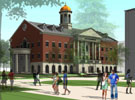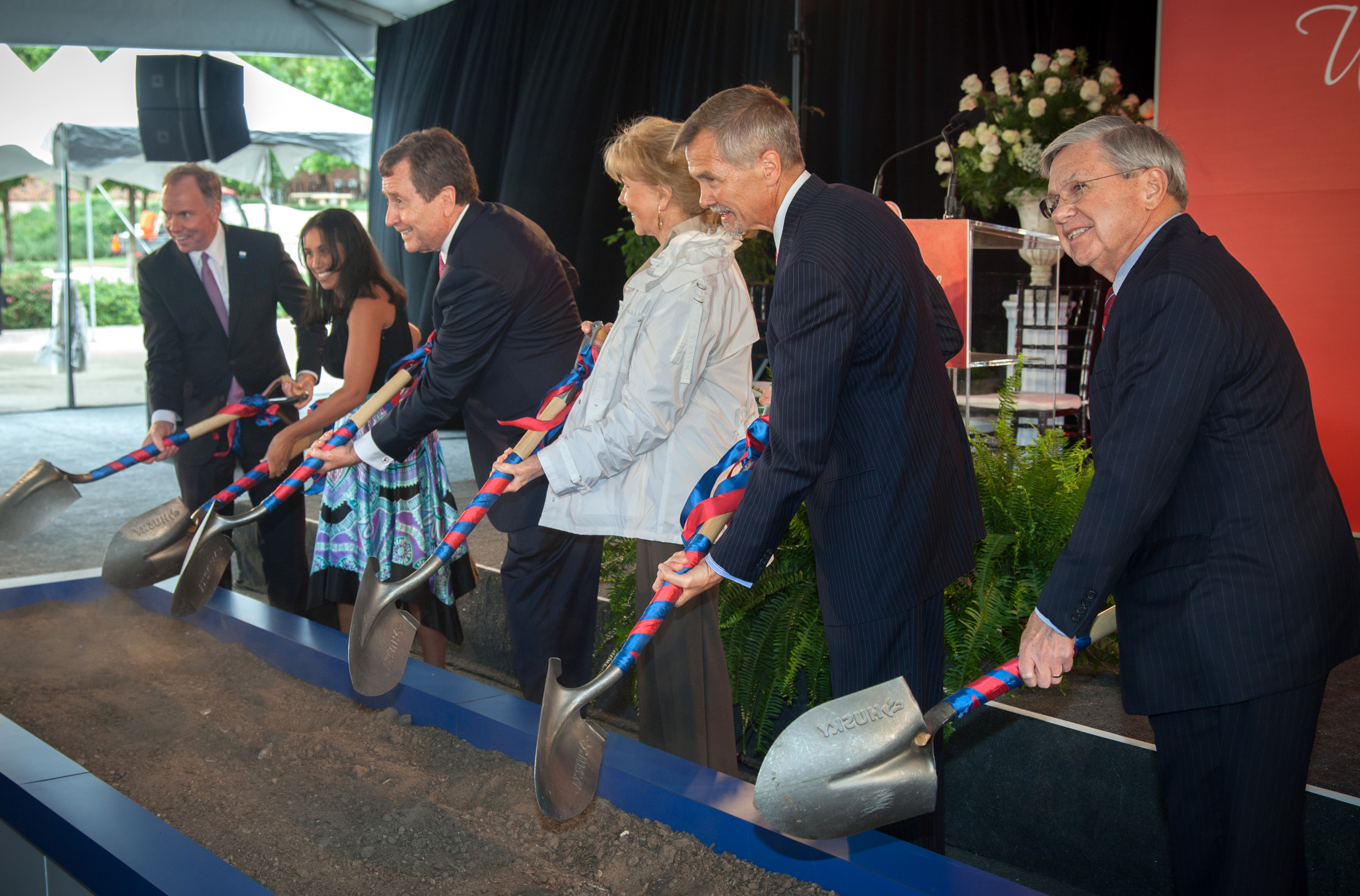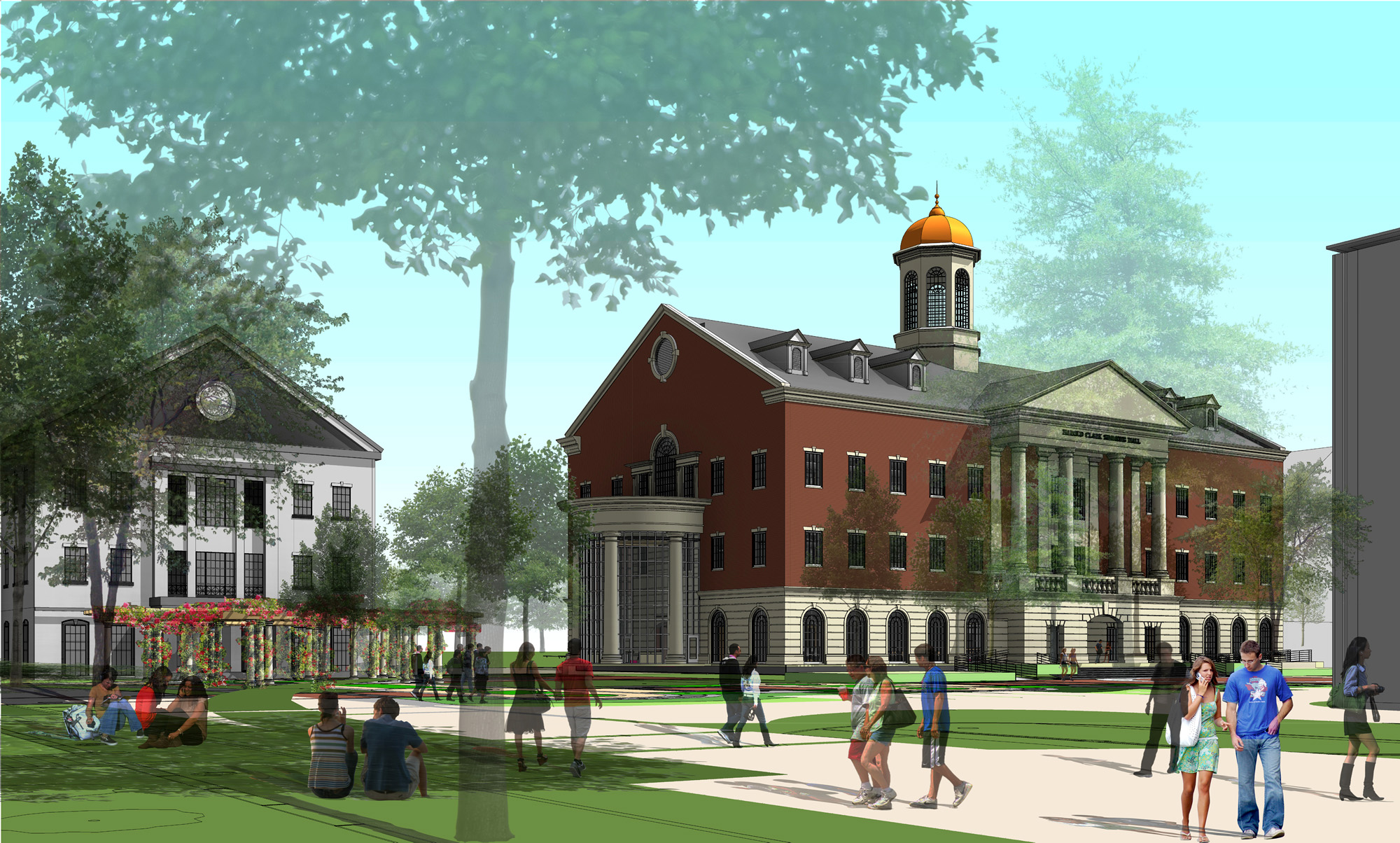SMU breaks ground for new education building
SMU has broken ground for the Harold Clark Simmons Hall education building.

DALLAS (SMU) – SMU broke ground Sept. 12 for Harold Clark Simmons Hall, the second building for the Annette Caldwell Simmons School of Education and Human Development.
The ceremony followed a gift of $25 million from Annette Caldwell Simmons and Harold C. Simmons in February 2013 to fund the new building and support three new endowed academic positions. The new facility will be named in honor of Mr. Simmons, at Mrs. Simmons’ request.
“This new building will support the growing impact and leadership of the Annette Caldwell Simmons School of Education and Human Development. The Simmons School excels in research productivity and innovative programs that have direct application to the critical education needs in our community and beyond,” said SMU President R. Gerald Turner. “The generosity of Harold and Annette Simmons reflects their wisdom and foresight in supporting programs that expand human potential and achievement. We are grateful to them for enabling us to increase student and faculty achievement in the school.”
Situated on the SMU campus along Airline Drive, Harold Clark Simmons Hall will be a three-story, 40,000-square-foot academic building that will be home to the Budd Center for Involving Communities in Education, the Teacher Development Studio and the Department of Teaching and Learning. The facility also will include classrooms, labs, faculty and administrative offices and conference rooms to meet the expanding program needs of the school. Completion is scheduled for late 2015.
“One dean should not have this much fun,” said David J. Chard, Leon Simmons Endowed Dean of the Simmons School, noting that in the space of a very short time, he has been privileged to break ground on two buildings made possible by Harold and Annette Simmons.
 On Sept. 12 SMU broke ground on Harold Clark Simmons Hall. From left are: Brad Cheves, vice president for Development and External Affairs; Miriam Ortiz, Ph.D. student who gave the invocation; R. Gerald Turner, SMU president; Mrs. Simmons, donor; David Chard, Simmons School dean; and Mike Boone, chair of the SMU Board of Trustees. |
“Harold C. Simmons Hall represents a generous commitment to the teachers and children of our region,” Chard added. “It will enable the Simmons School to help teachers optimize their impact on children's education. It will also serve as the hub of our community-based programs, allowing us to expand our understanding of the relationship between schools and the communities they serve.”
In 2007 Harold and Annette Simmons made a historic $20 million gift to SMU, which established endowments for the school and provided funding for the school’s first new building, Annette Caldwell Simmons Hall. The gift created an endowed graduate fellowship fund and an endowed deanship and faculty recruitment fund, both of which honored Mr. Simmons’ parents, who were educators in Golden, Texas. In recognition of their commitment, SMU named the school the Annette Caldwell Simmons School of Education and Human Development.
Their combined gifts of $45 million to the school make Harold and Annette Simmons’ commitment among the largest to SMU’s Second Century Campaign, also making them among the most generous donors in SMU’s 100-year history. Previous gifts include the endowment of four President’s Scholars and the creation of the Simmons Distinguished Professorship in Marketing in the Cox School of Business.
“The innovative programs of the Simmons School, including those to be housed in the new Harold Clark Simmons Hall, have the potential to influence the direction of American education,” said Paul W. Ludden, SMU provost and vice president for academic affairs. “They are also examples of the kind of intellectual capital that SMU is increasingly able to provide for the region and the nation.”
“We were a collection of unrelated programs,” Dean Chard said to Mrs. Simmons. “The seeds you and Harold planted have (allowed the Simmons School to become) a force for change.”
Mrs. Simmons earned a B.S. degree in elementary education from SMU in 1957 and later taught first, second and third grades at Maple Lawn Elementary School in Dallas and at Clark Field, a U.S. air base in the Philippines. Mrs. Simmons is a former member of the board of the SMU Tate Distinguished Lecture Series and has been active in numerous other SMU programs and civic activities.
Coverage by WFAA News and CBS 11 News |
The late Mr. Simmons was founder, chair and CEO of Contran Corporation, a holding company with interests in several industries. He is a former member of the executive boards of Cox School of Business and Dedman College of Humanities and Sciences. His relationship with SMU began in 1961 when he bought a small drugstore near the campus, Simmons University Drug. The enterprise eventually expanded to 100 stores. He sold the chain in 1973, and it later became Eckerd Drugs.
Harold Clark Simmons Hall will serve as home for these innovative programs of the Annette Caldwell Simmons School of Education and Human Development:
The Budd Center for Involving Communities in Education focuses on a strategic and holistic approach to fighting poverty by transforming education. It equips school districts and nonprofits as they work together to assess and meet the extraordinary needs of children in poverty. The center builds data-sharing infrastructure, makes previously inaccessible data available, teaches partners to translate data and uses data to develop collaborative and highly targeted plans to accelerate students’ academic success. Its work centers on West Dallas as a model that eventually can be adopted by other urban areas. Endowed in 2014 by Russell and Dorothy Budd ’06, the center is the backbone organization for The School Zone, a West Dallas collaboration of 26 social service agencies and 23 public and private schools.
The Teacher Development Studio will occupy three laboratories that are technologically equipped to train students in teaching, instructional design and assessment. These labs offer teachers a place to practice being teachers in low-stakes environments:
- The Teaching Performance Lab will simulate pre-K–12 classroom environments with computer avatars standing in for students. The avatars play the roles of students in classroom situations, and the teacher interacts through the same technology used in video games.
- The Assessment Lab offers software programs that allow teachers to create assessments and evaluate student performance. Assessment outcomes will be relayed to the Instructional Design Lab, where teachers can construct the resources they need to connect with their students.
- The Instructional Design Lab will provide teachers access to state-of-the-art technology as well as conventional materials to develop unit and lesson plans and technology applications to support student learning.

The Department of Teaching and Learning prepares educators to be scholars and leaders through teacher education programs at the undergraduate, post baccalaureate and graduate levels. Faculty members combine years of classroom experience with a deep knowledge of research-based practices to create high-quality learning environments. Many faculty members are actively involved in the local education community and work in schools, focusing on dyslexia, bilingual education, mathematics and special education. Programs offer students a comprehensive curriculum of theory, research, cross-disciplinary studies and practical experience.
Since 2007, the Simmons School has expanded from one department and several programs to five departments – Teaching and Learning, Education Policy and Leadership, Counseling and Dispute Resolution, Applied Physiology and Sport Management and Graduate Liberal Studies – offering eight graduate degree programs and one undergraduate degree program. The school has grown from 13 full-time faculty members and 42 staff members to 73 full-time faculty members and 112 full-time staff members. Research funding has increased to more than $27 million since 2007. In addition, the school hosts research conferences and provides continuing education to teachers throughout North Texas.
The school also has developed community outreach programs that complement degree programs. These include the Budd Center for Involving Communities in Education, the Center on Research and Evaluation, the Institute for Evidence-based Education, Research in Mathematics Education and college access programs. In addition, the Simmons School has appointed a faculty member in global health who is a concurrent fellow at the George W. Bush Institute. The school also partners with the Bush Institute on two landmark education initiatives, Middle School Matters and The Alliance to Reform Education Leadership.
“Construction of Harold Clark Simmons Hall is the most recent example of the remarkable impact of The Second Century Campaign throughout SMU,” said Brad E. Cheves, SMU vice president for Development and External Affairs. “Thanks to the inspiring generosity of donors, the campaign is enabling SMU to enhance the quality of students, faculty and facilities necessary for achievement in every area, and to raise its profile as a private university with a national and global reputation.”
SMU’s Second Century Campaign coincides with the celebration of the 100th anniversary of the University’s founding in 1911 and its opening in 1915. Counting the Simmons’ gift, the campaign has raised more than $902 million as of Sept. 12, 2014, toward a goal of $1 billion to support student quality, faculty and academic excellence and the campus experience.
###
Related Links:
- The Dallas Business Journal: Southern Methodist University prepares to start new Simmons building
- Newstalk Texas: SMU $25M gift drives 40,000-SF Simmons building
SMU is a nationally ranked private university in Dallas founded more than 100 years ago. Today SMU enrolls nearly 11,000 students who benefit from the academic opportunities and international reach of seven degree-granting schools.